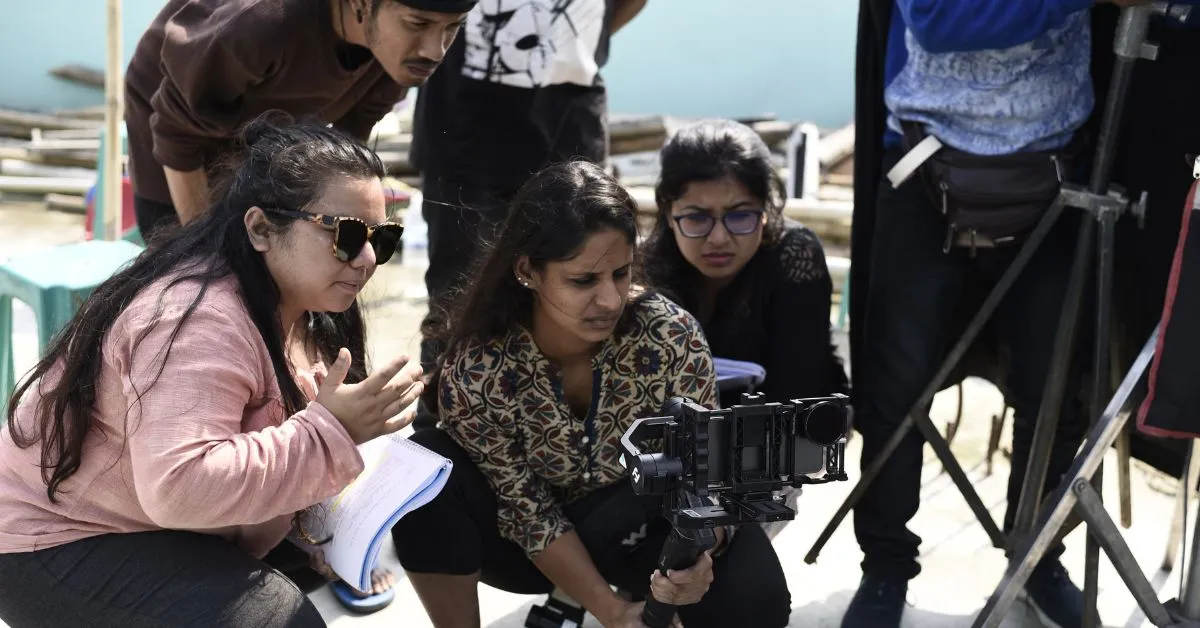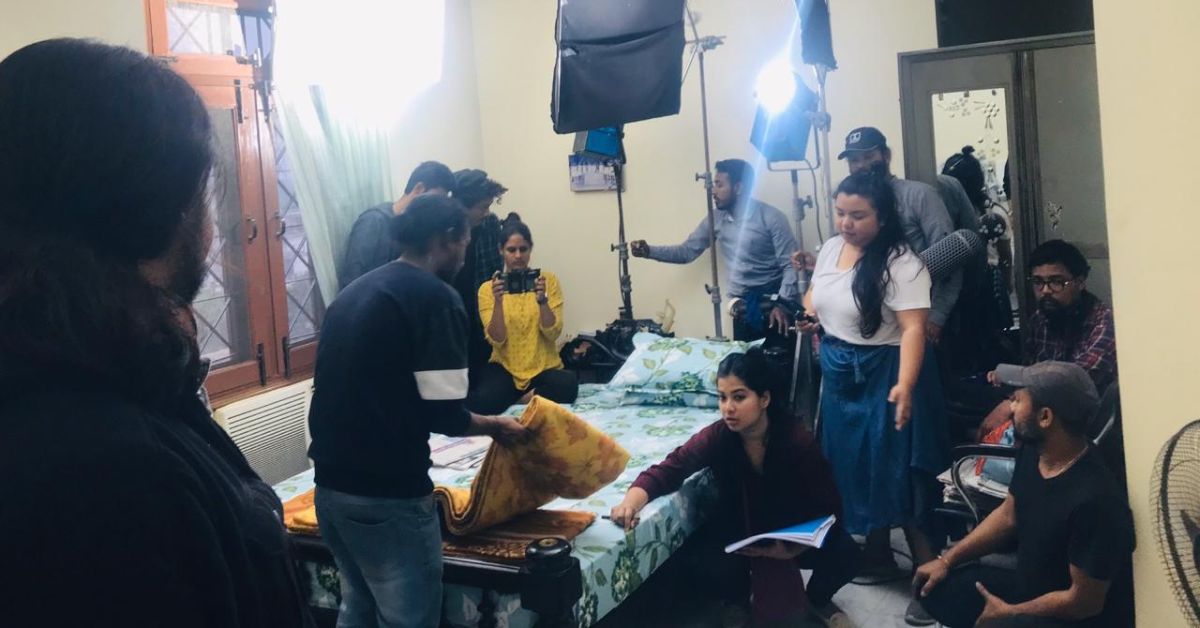Assamese filmmaker Kulanandini Mahanta scripted her name in the history books with the release of her debut film, Emuthi Puthi (A Very Fishy Trip), on June 17, 2022, with the film going on to become the first movie from the northeast to be shot entirely on iPhone.
Her efforts yielded fruitful results—Emuthi Puthi bagged the award for Best Assamese Film at the 70th National Film Awards declared on August 16, 2024.
In conversation with Dipankar Sarkar, Kulanandini Mahanta shares a detailed insight into her works and the journey thus far…
Dipankar Sarkar: Winning the National Award for your first film is quite an achievement.
Kulanandini: Winning a national award is a big thing that brings mixed feelings. When you make a film, looking for gratitude is normal because it motivates you to make more.
Every bit of praise adds up to that motivation towards making the journey of creativity more complete. However, receiving a national award is altogether another level of validation. I am overwhelmed and, at the same time, feeling surreal.
The fact of it is still sinking in, leaving me wondering, "Am I different, or are things around me different?"
Maybe neither. However, reflecting upon this honour, I realise it isn't about change. It's instead an affirmation—a much sought-after confidence boost for my wavering confidence, which asserts, "This is what I am supposed to be doing."
This award does not just recognise excellence on paper; instead, it confirms for me undeniably that the route taken was the right one. It makes me remember trusting myself and moving on because this is where my place lies.

Dipankar Sarkar: Tell us about your journey from cinematographer to director.
Kulanandini: The journey from a cinematographer to a director has been an evolving one that unfolds with each project.
Cinematography will always be my first love; it's where my passion for visual storytelling began. It's where I found my initial voice, crafting visual narratives that spoke louder than words.
The intimacy with light, shadow, and composition gave me a deep connection to storytelling, which felt complete and meditative. There's something gratifying about capturing the essence of a moment through the lens of translating emotions and narratives into images that resonate with the audience.
The perks of being a cinematographer are undeniable—the intimacy with the craft, the ability to shape the visual tone of a story, and the deep connection with the technical and artistic aspects of filmmaking.
However, stepping into the director's role opened up an entirely new horizon for me. Directing is more than just guiding a film; it's about shaping a vision and weaving together every element of the production to tell a cohesive and compelling story.
When I first transitioned into directing, my biggest fear was communicating with actors—a completely new challenge for someone whose focus had always been behind the camera.
But as soon as I donned the director's hat, that fear vanished. I realised that when you have a clear vision and a story you're passionate about, everything else falls into place. Communicating with actors became less daunting because the story itself became the common ground we all worked towards.
This journey so far has been immensely fulfilling. The experience of moving from cinematography to directing has allowed me to see the filmmaking process from a new vantage point.
My background as a cinematographer has been invaluable, giving me an edge in making certain decisions with a keen visual awareness.
Yet a director's job is far more complex and demanding than anyone can genuinely grasp until they're in the thick of it. It's a stress that I don't mind taking on, though—because the reward of seeing a story come to life, shaped by every choice you make, is unparalleled.

Dipankar Sarkar: Emuthi Puthi is the first feature film from the Northeast shot on an iPhone. How was your experience working with Ujwala Viswanath as the cinematographer?
Kulanandini Mahanta: Shooting Northeast India's first feature film on an iPhone was an exciting and challenging endeavour.
I had always desired to shoot a film on a phone. I was eager to test how much we could push ourselves creatively and technically with limited resources. When the opportunity presented itself, I didn't hesitate. I jumped right in, ready to explore the boundaries of what could be achieved with just a smartphone."
The passage is mostly correct, but here are a few minor adjustments for clarity and flow:
Ujwala and I go way back. We were flatmates while working in Los Angeles, so our communication was usually spot-on.
However, there were days when it felt like we were at -1/10. But that's the nature of filmmaking; the ups and downs are all part of the process.
Having worked together on multiple projects, it was easy to collaborate with her again on this film.
However, the language barrier presented an initial challenge.
Ujwala is non-Assamese, and although this was her second Assamese project, it was her first feature film.
Since the crew primarily spoke Assamese, I often mediated to ensure smooth communication. But Ujwala quickly adapted. Within a few days, she grasped the set's energy and found ways to communicate with her department and the rest of the crew. She indeed passed with flying colours."
During our pre-production discussions, I remember telling Ujwala, "We have been provided with four iPhones; whatever comes, let's just follow through these characters' journey."
With that in mind, we decided to shoot anamorphic, staying as close to the characters as possible to capture their emotions and stories intimately.
Although we were technically trained, shooting with iPhones was a whole new experience. It was a different ballgame, requiring us to rethink our approach and adapt quickly.
We conducted a few tests, but with very little prep time, we had to make do with the amenities we carried with us.
That's the nature of indie filmmaking—you work with what you have, improvise, and find creative solutions along the way. The experience was a mix of challenges and exhilaration.
Despite the limitations, our excitement knew no bounds. It was a journey of discovery, both for the characters in the film and for us as filmmakers, one that tested our skills and pushed us to think outside the box, ultimately leading to something extraordinary.
Dipankar Sarkar: What suggestion would you give to budding filmmakers who want to shoot their film on an iPhone?
Kulanandini Mahanta: First, ask yourself why you're choosing a phone. If the answer is low or no budget, go ahead with it and be ready to take on the challenges and risks that come with it. With advances in technology, nowadays companies like Apple are competing and advertising phones as filmmaking cameras.
With the advent of social media and constant content creation, people have become increasingly accustomed to shooting with phones. Anywhere you turn around, you'll see almost everyone with a phone constantly capturing.
Shooting a film on an iPhone can be both a rewarding and challenging experience. Understand what it can and can't do, and plan your shots accordingly. Rather than seeing the limitations of shooting on a phone as a drawback, use them as a creative challenge.
The compact size and portability of an iPhone can allow for unique angles and shots that might not be possible with traditional cameras. No matter the equipment, a strong story and well-developed characters are essential. Focus on crafting a compelling narrative that will engage your audience. Also, study other films shot on iPhones to see how filmmakers have tackled challenges and used the medium creatively.
Ultimately, the key is to focus on storytelling and creativity. The iPhone is just a tool—what matters most is the vision behind it and how you bring that vision to life.
Dipankar Sarkar: Do you have any plans for shooting your next feature film?
Kulanandini Mahanta: I'm currently immersed in writing my next feature film. If everything unfolds as planned, the project will soon see the light of day.
ALSO READ | Xahid Khan: Filmmaking Is An Expensive Way Of Expression
Dipankar Sarkar is a film critic who contributes to different publications- both national and international. He is a Research Fellowship from the NFAI, Pune, India, and was one of the panelists for the selection of world cinema at the 27th International Film Festival of Kerala in 2022.